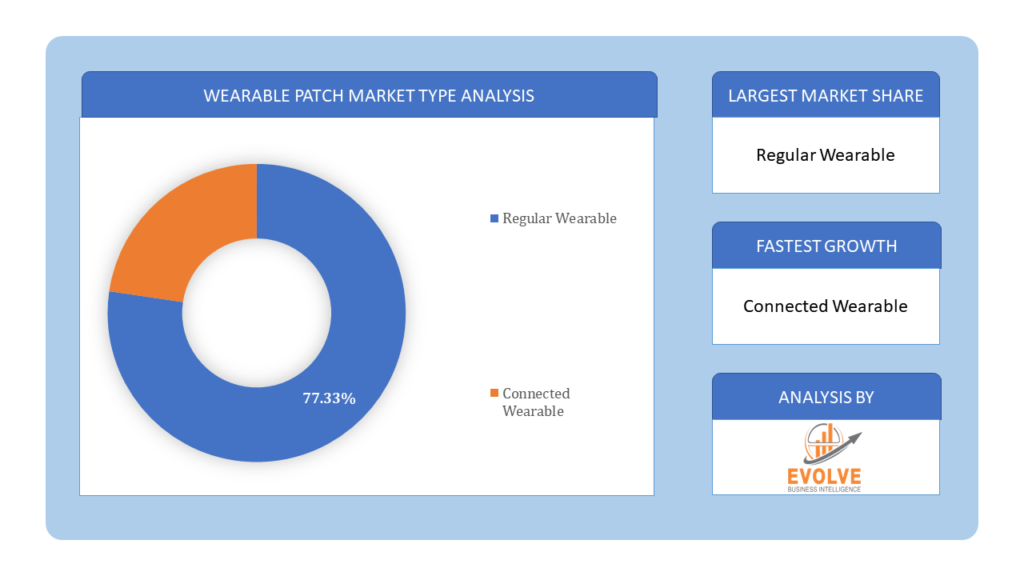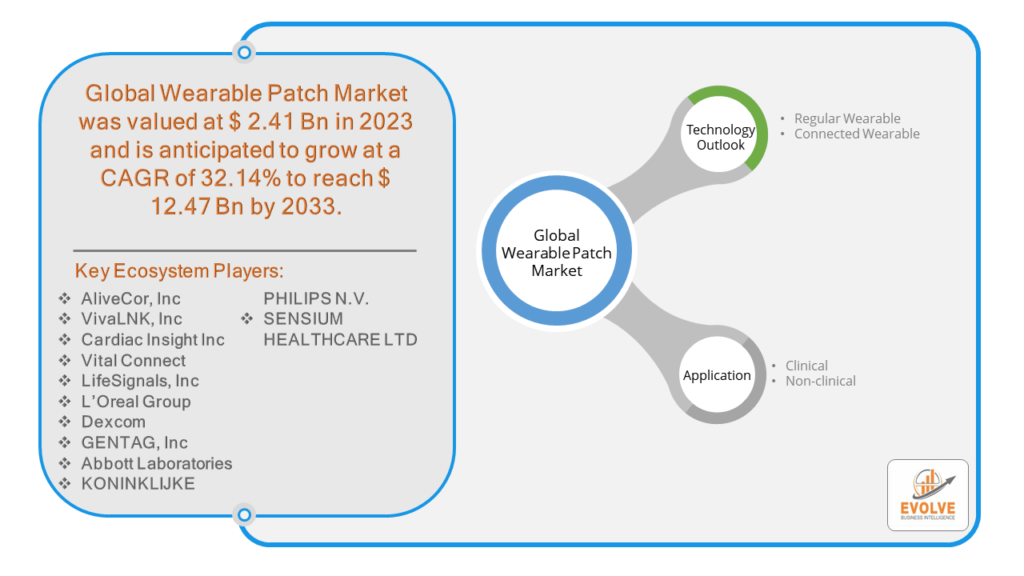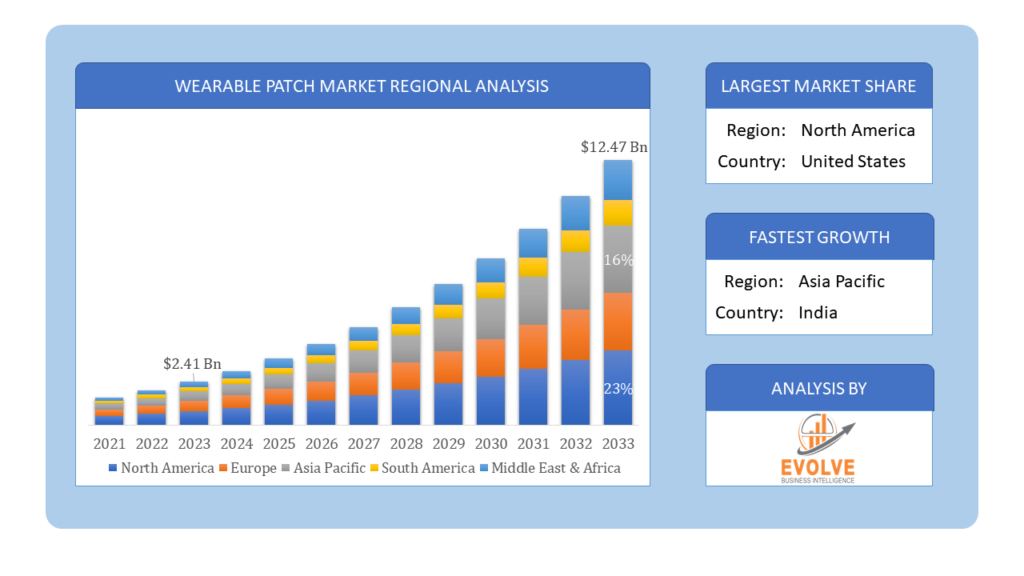Wearable Patch Market Analysis and Global Forecast 2023-2033
€ 1,230.43 – € 4,886.30Price range: € 1,230.43 through € 4,886.30
Wearable Patch Market Research Report: Information By Technology Outlook(Regular Wearable, Connected Wearable), By Application (Clinical, Non-clinical), and by Region — Forecast till 2033.
Page: 153
Wearable Patch Market Overview
The Wearable Patch Market Size is expected to reach USD 12.47 Billion by 2033. The Wearable Patch industry size accounted for USD 2.41 Billion in 2023 and is expected to expand at a compound annual growth rate (CAGR) of 32.14% from 2023 to 2033. The wearable patch market involves the production and sale of adhesive patches equipped with sensors and electronics that monitor health metrics. These patches can track vital signs, deliver medication, and provide real-time health data. They are used in various applications such as chronic disease management, fitness monitoring, and drug delivery. The market is growing rapidly due to advancements in technology, increasing prevalence of chronic diseases, and rising demand for remote patient monitoring and personalized healthcare solutions. Key players include medical device manufacturers, tech companies, and pharmaceutical firms.
Global Wearable Patch Market Synopsis
The COVID-19 pandemic has led to supply chain disruptions leading to supply shortages or lower demand in the wearable patch market. The travel restrictions and social-distancing measures have resulted in a sharp drop in consumer and business spending and this pattern is to continue for some time. The end-user trend and preferences have changed due to the pandemic and have resulted in manufacturers, developers, and service providers to adopt various strategies to stabilize the company.
Wearable Patch Market Dynamics
The major factors that have impacted the growth of Wearable Patch are as follows:
Drivers:
Ø Technological Advancements
Innovations in sensor technology, miniaturization of electronic components, and advancements in wireless communication have significantly enhanced the functionality, accuracy, and user-friendliness of wearable patches. Improved battery life and the integration of flexible and biocompatible materials have also contributed to their growing adoption.
Restraint:
- Data Privacy and Security Concerns
Wearable patches collect and transmit sensitive health data, raising concerns about data privacy and security. Ensuring robust protection against data breaches and unauthorized access is crucial to maintaining user trust and compliance with regulations such as GDPR in Europe and HIPAA in the U.S. The potential for cyberattacks and data misuse remains a significant concern for both consumers and manufacturers.
Opportunity:
⮚ Advancements in Personalized Medicine
Wearable patches can collect a vast array of health data specific to each individual, supporting the trend towards personalized medicine. By analyzing this data, healthcare providers can tailor treatments to the unique needs of each patient, improving the efficacy of interventions and patient satisfaction. This personalization can drive higher adoption rates of wearable patches.
Wearable Patch Segment Overview
By Technology Outlook
 Based on Technology Outlook , the market is segmented based on Regular Wearable, Connected Wearable. The connected wearable segment dominates the market due to its advanced capabilities for real-time data transmission, remote monitoring, and integration with digital health platforms, which enhance patient care and health management.
Based on Technology Outlook , the market is segmented based on Regular Wearable, Connected Wearable. The connected wearable segment dominates the market due to its advanced capabilities for real-time data transmission, remote monitoring, and integration with digital health platforms, which enhance patient care and health management.
By Application
Based on Applications, the market has been divided into the Clinical, Non-clinical. The clinical segment, which includes chronic disease management, remote patient monitoring, and drug delivery, dominates the market due to the increasing need for continuous health monitoring and personalized treatment in healthcare settings.
Global Wearable Patch Market Regional Analysis
Based on region, the global Wearable Patch market has been divided into North America, Europe, Asia-Pacific, the Middle East & Africa, and Latin America. North America is projected to dominate the use of the Wearable Patch market followed by the Asia-Pacific and Europe regions.
 Wearable Patch North America Market
Wearable Patch North America Market
North America holds a dominant position in the Wearable Patch Market. Due to sufficient reimbursement regulations, higher per capita spending on cutting-edge technologies, and market participants’ ongoing focus on launching cutting-edge wearable devices in this area, the wearable medical device market in North America is expected to dominate. In addition, the wearable medical device market in the US had the biggest market share, while the market in Canada was expanding at the quickest rate in the North American continent.
Wearable Patch Asia-Pacific Market
The Asia-Pacific region has indeed emerged as the fastest-growing market for the Wearable Patch industry. From 2023 to2032, the wearable medical device market in Asia-Pacific is anticipated to expand at the quickest rate (CAGR). This is because the number of elderly people in this area is growing, as is the cost of healthcare. In addition, the wearable medical device market in China had the most market share, while the market in India had the quickest rate of growth in the Asia-Pacific area.
Competitive Landscape
The global Wearable Patch market is highly competitive, with numerous players offering a wide range of software solutions. The competitive landscape is characterized by the presence of established companies, as well as emerging startups and niche players. To increase their market position and attract a wide consumer base, the businesses are employing various strategies, such as product launches, and strategic alliances.
Prominent Players:
- AliveCor, Inc
- VivaLNK, Inc
- Cardiac Insight Inc
- Vital Connect
- LifeSignals, Inc
- L’Oreal Group
- Dexcom
- GENTAG, Inc
- Abbott Laboratories
- KONINKLIJKE PHILIPS N.V.
- SENSIUM HEALTHCARE LTD
Key Development
In September 2022, L’Oréal Group made a key development in the wearable patch market by launching the HAPTA smart applicator, a handheld, computerized device designed to help individuals with limited hand and arm mobility apply makeup more easily and precisely.
Scope of the Report
Global Wearable Patch Market, by Technology Outlook
- Regular Wearable
- Connected Wearable
Global Wearable Patch Market, by Application
- Clinical
- Non-clinical
Global Wearable Patch Market, by Region
- North America
- US
- Canada
- Mexico
- Europe
- UK
- Germany
- France
- Italy
- Spain
- Benelux
- Nordic
- Rest of Europe
- Asia Pacific
- China
- Japan
- South Korea
- Indonesia
- Austalia
- Malaysia
- India
- Rest of Asia Pacific
- South America
- Brazil
- Argentina
- Rest of South America
- Middle East & Africa
- Saudi Arabia
- UAE
- Egypt
- South Africa
- Rest of Middle East & Africa
| Parameters | Indicators |
|---|---|
| Market Size | 2033: $12.47 Billion |
| CAGR | 32.14% CAGR (2023-2033) |
| Base year | 2022 |
| Forecast Period | 2023-2033 |
| Historical Data | 2021 |
| Report Coverage | Revenue Forecast, Competitive Landscape, Growth Factors, and Trends |
| Key Segmentations | Technology Outlook , Application |
| Geographies Covered | North America, Europe, Asia-Pacific, Latin America, Middle East, Africa |
| Key Vendors | AliveCor, Inc, VivaLNK, Inc, Cardiac Insight Inc, Vital Connect, LifeSignals, Inc, L’Oreal Group, Dexcom, GENTAG, Inc, Abbott Laboratories, KONINKLIJKE PHILIPS N.V.; SENSIUM HEALTHCARE LTD |
| Key Market Opportunities | • Increasing adoption of home healthcare as an alternative to hospitals |
| Key Market Drivers | • Growing prevalence of chronic diseases, along with growing mortality rates |
REPORT CONTENT BRIEF:
- High-level analysis of the current and future Wearable Patch market trends and opportunities
- Detailed analysis of current market drivers, restraining factors, and opportunities in the future
- Wearable Patch market historical market size for the year 2021, and forecast from 2023 to 2033
- Wearable Patch market share analysis at each product level
- Competitor analysis with detailed insight into its product segment, Government & Defense strength, and strategies adopted.
- Identifies key strategies adopted including product launches and developments, mergers and acquisitions, joint ventures, collaborations, and partnerships as well as funding taken and investment done, among others.
- To identify and understand the various factors involved in the global Wearable Patch market affected by the pandemic
- To provide a detailed insight into the major companies operating in the market. The profiling will include the Government & Defense health of the company’s past 2-3 years with segmental and regional revenue breakup, product offering, recent developments, SWOT analysis, and key strategies.
Press Release

Global Pharmaceutical Manufacturing Market to Reach $1.38 Trillion by 2035 with 7.35% CAGR, New Research Shows

The Global Mammography Market Is Estimated To Record a CAGR of Around 10.29% During The Forecast Period

Glue Stick Market to Reach USD 2.35 Billion by 2034

Podiatry Service Market to Reach USD 11.88 Billion by 2034

Microfluidics Technology Market to Reach USD 32.58 Billion by 2034

Ferric Chloride Market to Reach USD 10.65 Billion by 2034

Family Practice EMR Software Market to Reach USD 21.52 Billion by 2034

Electric Hairbrush Market to Reach USD 15.95 Billion by 2034

Daily Bamboo Products Market to Reach USD 143.52 Billion by 2034

Cross-border E-commerce Logistics Market to Reach USD 112.65 Billion by 2034
Frequently Asked Questions (FAQ)
1.What is the study period of this market?
- The study period of the global Wearable Patch market is 2021- 2033
2.What is the growth rate of the global Wearable Patch market?
- The global Wearable Patch market is growing at a CAGR of 32.14% over the next 10 years
3.Which region has the highest growth rate in the market of Wearable Patch?
- Asia Pacific is expected to register the highest CAGR during 2023-2033
4.Which region has the largest share of the global Wearable Patch market?
- North America holds the largest share in 2022
5.Who are the key players in the global Wearable Patch market?
AliveCor, Inc, VivaLNK, Inc, Cardiac Insight Inc, Vital Connect, LifeSignals, Inc, L’Oreal Group, Dexcom, GENTAG, Inc, Abbott Laboratories, and KONINKLIJKE PHILIPS N.V.; SENSIUM HEALTHCARE LTD are the major companies operating in the market
6.Do you offer Post Sale Support?
- Yes, we offer 16 hours of analyst support to solve the queries
7.Do you sell particular sections of a report?
Yes, we provide regional as well as country-level reports. Other than this we also provide a sectional report. Please get in contact with our sales representatives
Table of Content
Chapter 1. Executive Summary Chapter 2. Scope Of The Study 2.1. Market Definition 2.2. Scope Of The Study 2.2.1. Objectives of Report 2.2.2. Limitations 2.3. Market Structure Chapter 3. Evolve BI Methodology Chapter 4. Market Insights and Trends 4.1. Supply/ Value Chain Analysis 4.1.1. Raw Applications Providers 4.1.2. Manufacturing Process 4.1.3. Distributors/Retailers 4.1.4. End-Use Industry 4.2. Porter’s Five Forces Analysis 4.2.1. Threat Of New Entrants 4.2.2. Bargaining Power Of Buyers 4.2.3. Bargaining Power Of Suppliers 4.2.4. Threat Of Substitutes 4.2.5. Industry Rivalry 4.3. Impact Of COVID-19 on the Wearable Patch Market 4.3.1. Impact on Market Size 4.3.2. End-Use Industry Trend, Preferences, and Budget Impact 4.3.3. Regulatory Framework/Government Policies 4.3.4. Key Players' Strategy to Tackle Negative Impact 4.3.5. Opportunity Window 4.4. Technology Overview 12.28. Macro factor 4.6. Micro Factor 4.7. Demand Supply Gap Analysis of the Wearable Patch Market 4.8. Import Analysis of the Wearable Patch Market 4.9. Export Analysis of the Wearable Patch Market Chapter 5. Market Dynamics 5.1. Introduction 5.2. DROC Analysis 5.2.1. Drivers 5.2.2. Restraints 5.2.3. Opportunities 5.2.4. Challenges 5.3. Patent Analysis 5.4. Industry Roadmap 5.5. Parent/Peer Market Analysis Chapter 6. Global Wearable Patch Market, By Technology Outlook 6.1. Introduction 6.2. Regular Wearable 6.3. Connected Wearable Chapter 7. Global Wearable Patch Market, By Application 7.1. Introduction 7.2. Clinical 7.3. Non-clinical Chapter 8. Global Wearable Patch Market, By Region 8.1. Introduction 8.2. North America 8.2.1. Introduction 8.2.2. Driving Factors, Opportunity Analyzed, and Key Trends 8.2.3. Market Size and Forecast, By Country, 2023-2033 8.2.4. Market Size and Forecast, By Technology Outlook , 2023-2033 8.2.5. Market Size and Forecast, By Application, 2023-2033 8.2.6. US 8.2.6.1. Introduction 8.2.6.2. Driving Factors, Opportunity Analyzed, and Key Trends 8.2.6.3. Market Size and Forecast, By Technology Outlook , 2023-2033 8.2.6.4. Market Size and Forecast, By Application, 2023-2033 8.2.7. Canada 8.2.7.1. Introduction 8.2.7.2. Driving Factors, Opportunity Analyzed, and Key Trends 8.2.7.4. Market Size and Forecast, By Technology Outlook , 2023-2033 8.2.7.5. Market Size and Forecast, By Application, 2023-2033 8.3. Europe 8.3.1. Introduction 8.3.2. Driving Factors, Opportunity Analyzed, and Key Trends 8.3.3. Market Size and Forecast, By Country, 2023-2033 8.3.4. Market Size and Forecast, By Technology Outlook , 2023-2033 8.3.5. Market Size and Forecast, By Application, 2023-2033 8.3.6. Germany 8.3.6.1. Introduction 8.3.6.2. Driving Factors, Opportunity Analyzed, and Key Trends 8.3.6.3. Market Size and Forecast, By Technology Outlook , 2023-2033 8.3.6.4. Market Size and Forecast, By Application, 2023-2033 8.3.7. France 8.3.7.1. Introduction 8.3.7.2. Driving Factors, Opportunity Analyzed, and Key Trends 8.3.7.3. Market Size and Forecast, By Technology Outlook , 2023-2033 8.3.7.4. Market Size and Forecast, By Application, 2023-2033 8.3.8. UK 8.3.8.1. Introduction 8.3.8.2. Driving Factors, Opportunity Analyzed, and Key Trends 8.3.8.3. Market Size and Forecast, By Technology Outlook , 2023-2033 8.3.8.4. Market Size and Forecast, By Application, 2023-2033 8.3.9. Italy 8.3.9.1. Introduction 8.3.9.2. Driving Factors, Opportunity Analyzed, and Key Trends 8.3.9.3. Market Size and Forecast, By Technology Outlook , 2023-2033 8.3.9.4. Market Size and Forecast, By Application, 2023-2033 8.3.11. Rest Of Europe 8.3.11.1. Introduction 8.3.11.2. Driving Factors, Opportunity Analyzed, and Key Trends 8.3.11.3. Market Size and Forecast, By Technology Outlook , 2023-2033 8.3.11.4. Market Size and Forecast, By Application, 2023-2033 8.4. Asia-Pacific 8.4.1. Introduction 8.4.2. Driving Factors, Opportunity Analyzed, and Key Trends 8.4.3. Market Size and Forecast, By Country, 2023-2033 8.4.4. Market Size and Forecast, By Technology Outlook , 2023-2033 8.12.28. Market Size and Forecast, By Application, 2023-2033 8.4.6. China 8.4.6.1. Introduction 8.4.6.2. Driving Factors, Opportunity Analyzed, and Key Trends 8.4.6.3. Market Size and Forecast, By Technology Outlook , 2023-2033 8.4.6.4. Market Size and Forecast, By Application, 2023-2033 8.4.7. India 8.4.7.1. Introduction 8.4.7.2. Driving Factors, Opportunity Analyzed, and Key Trends 8.4.7.3. Market Size and Forecast, By Technology Outlook , 2023-2033 8.4.7.4. Market Size and Forecast, By Application, 2023-2033 8.4.8. Japan 8.4.8.1. Introduction 8.4.8.2. Driving Factors, Opportunity Analyzed, and Key Trends 8.4.8.3. Market Size and Forecast, By Technology Outlook , 2023-2033 8.4.8.4. Market Size and Forecast, By Application, 2023-2033 8.4.9. South Korea 8.4.9.1. Introduction 8.4.9.2. Driving Factors, Opportunity Analyzed, and Key Trends 8.4.9.3. Market Size and Forecast, By Technology Outlook , 2023-2033 8.4.9.4. Market Size and Forecast, By Application, 2023-2033 8.4.10. Rest Of Asia-Pacific 8.4.10.1. Introduction 8.4.10.2. Driving Factors, Opportunity Analyzed, and Key Trends 8.4.10.3. Market Size and Forecast, By Technology Outlook , 2023-2033 8.4.10.4. Market Size and Forecast, By Application, 2023-2033 8.5. Rest Of The World (RoW) 8.5.1. Introduction 8.5.2. Driving Factors, Opportunity Analyzed, and Key Trends 8.5.3. Market Size and Forecast, By Technology Outlook , 2023-2033 8.5.4. Market Size and Forecast, By Application, 2023-2033 Chapter 9. Company Landscape 9.1. Introduction 9.2. Vendor Share Analysis 9.3. Key Development Analysis 9.4. Competitor Dashboard Chapter 10. Company Profiles 10.1. AliveCor, Inc 10.1.1. Business Overview 10.1.2. Government & Defense Analysis 10.1.2.1. Government & Defense – Existing/Funding 10.1.3. Product Portfolio 10.1.4. Recent Development and Strategies Adopted 10.1.5. SWOT Analysis 10.2. VivaLNK, Inc 10.2.1. Business Overview 10.2.2. Government & Defense Analysis 10.2.2.1. Government & Defense – Existing/Funding 10.2.3. Product Portfolio 10.2.4. Recent Development and Strategies Adopted 10.2.5. SWOT Analysis 10.3. Cardiac Insight Inc 10.3.1. Business Overview 10.3.2. Government & Defense Analysis 10.3.2.1. Government & Defense – Existing/Funding 10.3.3. Product Portfolio 10.3.4. Recent Development and Strategies Adopted 10.3.5. SWOT Analysis 10.4. Vital Connect 10.4.1. Business Overview 10.4.2. Government & Defense Analysis 10.4.2.1. Government & Defense – Existing/Funding 10.4.3. Product Portfolio 10.4.4. Recent Development and Strategies Adopted 10.12.28. SWOT Analysis 10.5. LifeSignals, Inc 10.5.1. Business Overview 10.5.2. Government & Defense Analysis 10.5.2.1. Government & Defense – Existing/Funding 10.5.3. Product Portfolio 10.5.4. Recent Development and Strategies Adopted 10.5.5. SWOT Analysis 10.6. L’Oreal Group 10.6.1. Business Overview 10.6.2. Government & Defense Analysis 10.6.2.1. Government & Defense – Existing/Funding 10.6.3. Product Portfolio 10.6.4. Recent Development and Strategies Adopted 10.6.5. SWOT Analysis 10.7. Dexcom 10.7.1. Business Overview 10.7.2. Government & Defense Analysis 10.7.2.1. Government & Defense – Existing/Funding 10.7.3. Product Portfolio 10.7.4. Recent Development and Strategies Adopted 10.7.5. SWOT Analysis 10.8 GENTAG, Inc 10.8.1. Business Overview 10.8.2. Government & Defense Analysis 10.8.2.1. Government & Defense – Existing/Funding 10.8.3. Product Portfolio 10.8.4. Recent Development and Strategies Adopted 10.8.5. SWOT Analysis 10.9 Abbott Laboratories 10.9.1. Business Overview 10.9.2. Government & Defense Analysis 10.9.2.1. Government & Defense – Existing/Funding 10.9.3. Product Portfolio 10.9.4. Recent Development and Strategies Adopted 10.9.5. SWOT Analysis 10.10. KONINKLIJKE PHILIPS N.V.; SENSIUM HEALTHCARE LTD 10.10.1. Business Overview 10.10.2. Government & Defense Analysis 10.10.2.1. Government & Defense – Existing/Funding 10.10.3. Product Portfolio 10.10.4. Recent Development and Strategies Adopted 10.10.5. SWOT Analysis
Connect to Analyst
Research Methodology








